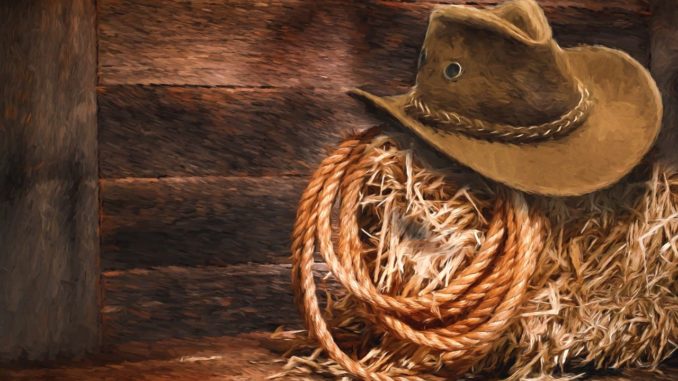
About the Author
James Ciccone was born in Auburn, New York. He graduated Colgate University with a B.A. in Religion and earned a law degree at Albany Law School. This is his debut novel.
INSPIRED BY THE LEGEND OF CRAWFORD “CHEROKEE BILL” GOLDSBY AND THE COOK GANG NOTORIOUS BLACK OUTLAWS OF THE WILD WEST
Prairie Rose Publications-Sundown Press (August 26, 2020)
A Good Day To Die is a fictional historical western
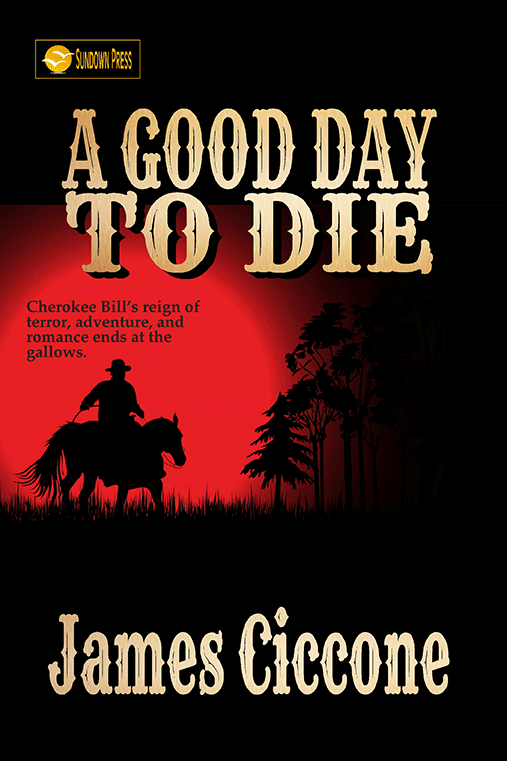
Excerpt pp. 78-87
By the age of twelve, the half-breed outlaw, Crawford “Cherokee Bill” Goldsby, had already managed to quit school, drink liquor, hangout with outlaws, shoot and kill a man, win an acquittal on a murder charge in open court, and begin a crime spree to rival the exploits of Wild Bill Hitchcock, Billy the Kid, Jesse James, Johnny Ringo, the Calico Cowboy, and Butch Cassidy and the Sundance. Set in Indian Territory of the 1890s, his reign of terror would eventually end with his capture, a murder trial before a hanging judge in Fort Smith, Arkansas, an appeal to the Supreme Court, a jail break, and finally a march to the gallows. At page 78, we see 18 y/o Cherokee Bill brazenly return to the small town of Chandler, Oklahoma only days after he robbed the local bank. The reason for his return: his desire to visit the woman he loves, Maggie Glass, a prostitute in the brothel above the saloon. We pick up the story listening to their conversation that while they are in bed together, a conversation that remains relevant to the racial divide that exists today:
Buy the Book
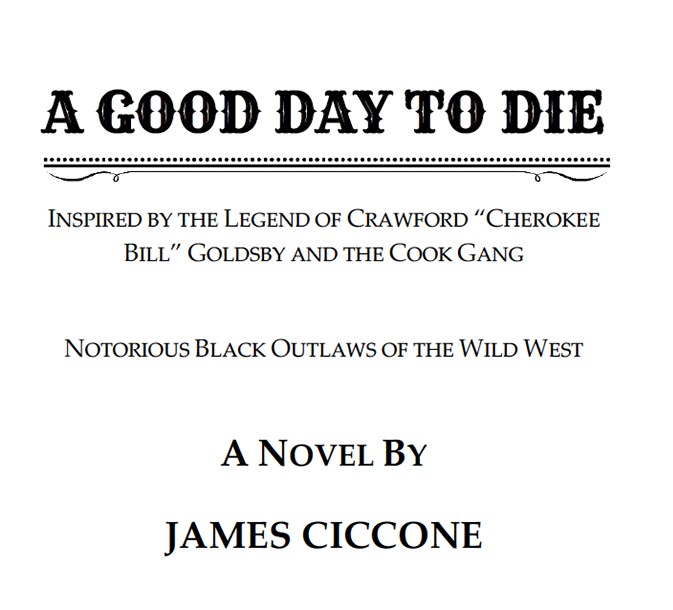
There was a porcelain bathtub in the corner pulled out of a wooden closet. It was full of soapy water. There was a dimly lit hurricane lamp with a fancy hand painted globe. There was a vanity table, a night stand, and an upholstered loveseat. There was a folding screen set up, a Japanese affair, where modest guests could disrobe in privacy.The hardwood floors were waxed to brilliance. There was a brass spittoon in the corner of the room that had been polished to perfection. There was a candle burning to hide the unfortunate smells that no amount of soapy water and perfume could extinguish from certain guests who had come from the liveries, the cattle drives, and the cotton fields.
Downstairs, a fancy negro smiled and played jumpy tunes on a standup piano. He played the piano magnificently.The saloon was crowded. There were bursts of laughter, and the sound of the solid glass bottoms of whiskey shot glasses pounding the bar. I could hear the sounds straight through the floor.
Outside, the night air from the prairie was crisp and clean. The cowboys had looped the reins of their horses over the wooden hitching rails in front of the saloon. The railroad men were inside, too. They hung their red lanterns on the same hitching rails. The horses were busy at the water troughs, lifting their heads dumbly when the saloon racket became tumultuous. The red railroad lanterns blinked and winked in the dark. Teams of horses pulled wagons along the dusty street, moving in and out of shadows left everywhere by gas lanterns.
“How’d you get into this line of work, anyway?” Maggie asked, rearranging the quilt.
“Same way I suppose you got into your line of work, pretty gal like you,” I suggested, turning to look at Maggie.
“How’s that?”
“Born black,” I cracked.
“They mostly call us half-breeds in this town, not black, Crawford.” Maggie chuckled.
“Don’t matter what they call us. Matters what we are,” I said, spitting at the floor while leaning over the side of the bed.
“You look more white than colored,” Maggie observed.
“I’m half white, half colored, half Cherokee, and half Sioux and half a few other things. I hope that settles the question,” I joked.
“That’s too many halves,” Maggie joked back.
“A man can’t have too many halves in life, sweetheart. A man can use as many halves as he can get, wouldn’t you agree?” I teased.
“Which half is which?” Maggie used her index finger to slowly trace an imaginary line from my shoulder to the palm of my right hand.
“I’m Cherokee, Sioux, and white from the waist up. Colored from the waist down. Does that answer your question?”
“I suppose so. What’s a girl to say? I think you have enough going for you down there that I just might decide to make you a keeper.”
“What the hell does that mean?” I pretended not to understand her question.
“Means you’ll owe more money for another hour if I manage to keep you talking, Cherokee Bill,” Maggie cracked. She was good at talking to men, very professional.
“Is that all I mean to you, money?” I joked.
“Yup, that would be about it.” We both laughed.
“I always say of the ten things that can happen when you meet a woman and fall in love, nine of them are bad,” I said.
“Are you in love?” Maggie smiled, trying to make her look of mock expectation show.
“Nope,” I replied. “Are you?”
“Nope,” Maggie agreed. We laughed again.
“You could have fooled me about a quarter of an hour ago,” I said. “I’m good at fooling people. That’s the business I’m in,” said Maggie. “That’s nice. I’m good at robbing banks. That’s the business I’m in. You’re good at talking to men. I guess each of us has our calling.”
“Why do you keep robbing banks?”
“I keep needing money, damnedest thing.” I laughed.
“Come on, it was a serious question,” Maggie sat up and reclined against the headboard, clinging to the part of the quilt that still covered her bosom.
“I want to get out of Indian Territory. I want to take Ma, Auntie, my sister, anyone who is serious about the world with me.”
“I’m serious about the world, Crawford. Will you save me, too?” Maggie asked, smirking.
“Will I what?” I pretended not to hear her question. I wanted to match Maggie’s sarcasm.
“All that money you get robbing people, could change me into a decent woman, wife material,” Maggie made a face to show that she was being facetious.
“Maggie, ain’t that much money in the whole world,” I teased. “And it’s a mighty big world, too, Maggie, mighty big.” We laughed freely. We were so carefree in those days.
“How’d you get the name Cherokee Bill, anyway?”
“My grandfather.”
“Your grandfather?”
“Yes, before I was born, my mother and father told my grandfather they were going to honor him by giving me his name. He thanked them for their respect and generosity. And then he asked them if they wanted to hear a secret. When they said yes, he said the secret is that he was going to call me Cherokee Bill whether they named me that or not,” I said.
“Is that a true story?” Maggie asked, laughing.
“No. But it felt incredibly good to tell,” I joked.
“A fancy name like that tends to stand out. It’s not a good name for a bank robber. Maybe you should call yourself plain old Bill. How are you going to stay ahead of the law with a name like Cherokee Bill?”
“They got guns. We got guns, is how.” I shifted to a sitting position, looked across the room at the flickering candles, and got serious.
“They got a hanging judge in Arkansas and sixty-five deputy marshals to go along with their guns, too. They’re looking to arrest everything that moves wrong in Indian Territory. They work more like a gang than the law, crossing over the border from Arkansas to catch guys on one of their warrants. They get their jurisdiction directly from Congress, and the judge was appointed by President Ulysses S. Grant himself. They haul white, black, and Indian out of here in prison wagons, seen it myself. They wait ‘til they got a wagon full of men, then they leave. Sometimes, the men can sit in the prison wagon for a month waiting to get hauled off to Arkansas. They never come back alive neither. They got the Katy and Frisco railroad lines with through trains and Pullman sleepers going straight through all parts of the land out here following the routes of the cattle drives. They want to develop all this land going west and lay railroad tracks everywhere. It seems. They’re looking for investors and home seekers, and they are advertising banks and guns and land and lawyers and oil. It’s easy to see how they don’t want no bank robbers and outlaws to stay in the picture. They got no plan for what the land grabs will do to the wildlife or the water, not to mention the people. I read the newspapers. It’s easy to figure out they don’t care about nobody that gets in the way of settlers. They’re calling a land rush of non-Indians progress, which means white men who have money to invest. This whole place is going to start booming when the railroads get going good. Good for business. The president, senators, or any of the politicians don’t want nothing getting in the way of the flow of money, probably a lot of it goes under the table in Washington. They’re after outlaws, Crawford,” Maggie, who was far from stupid, had a lot to say.
“You know how to read, Maggie?” I asked. I started to focus on the parts of her speech that interested me.
“Yes, doesn’t everyone?” Maggie replied.
I didn’t answer. Instead, I moved the conversation along. “I ain’t no outlaw,” I said.
“What?” Maggie said, laughing apprehensively.
“I’m a hero,” I declared.
“A hero! How so?” Maggie asked, still laughing.
“I am living proof that good is bigger than evil. Who do you regard as your heroes, presidents and congressmen, politicians, guys like that, the guys who’ll steal your land and your left eye socket for a dollar three eighty-five?”
“And the killing? How do you explain that? Is the killing heroic?” Maggie asked.
“Not heroic, not terribly heroic anyway, Maggie. It’s the cost of doing business. Look at it as a business expense,” I said. “How many did the government kill when they opened up the border and started the march to the Cherokee Nation? If a white man kills one million, he gets a national holiday. If a Cherokee steals a pocket watch, he gets hanged. If you’re mad at me for being a hero, sweetheart, you’ll have to excuse me for offense. Let me apologize in advance for not updating the myth. Cherokees only worship that which is worthy of worshipping.”
“Okay, but how about robbing a bank? How does that make you a hero?” Maggie persisted.
“Because I never saw a dime of any of that money.”
“What do you mean by that?”
“The money owed to my father back when they made him be a slave. He ran away to free himself. So I figure robbing banks ain’t really stealing after all, is it? It’s actually just getting even,” I said.
“Figured wrong, Crawford. They don’t call it stealing. They don’t call it anything. I guess they think they can get away with just forgetting about it. Like they’re sending money out here to buy the land out here real cheap. They don’t call that stealing either. They call it negotiation,” Maggie said.
“Not their land to negotiate against,” I insisted.
“How you figure on stopping them?”
“I don’t. I’m not figuring on stopping nobody. I’m figuring on getting my fortune and shooting anyone who crosses my path when I’m on my way to getting it.”
“Sounds so exciting. What is your plan?” Maggie asked.
“Where are those banks you read up on in the newspapers anyway?” I asked.
“Tulsa,” Maggie said.
“Good. I’ve got a mind to visit Tulsa. Sounds like a beautiful place,” I said.
“They got plenty of lawmen with guns in Tulsa,” Maggie added. “They’ve got guns. We got guns. I’ve got blood that goes back to slavery that’s as good as the blood of any man with a gun. Pa fought on both sides of the war, Union and Confederate, shot up some cowboys in Texas for desecrating the Army uniform and calling one of the sergeants a nigger, and went on the lam in the Cherokee Nation to keep from getting lynched. That’s where he met my ma’. Ma’s a Cherokee freedman. We’ve been escaping from the law ever since, except my dad got back his itchy trigger finger when I was still a boy. He changed his name and re-enlisted as a white man. The government is pushing us off our land. They have an itch to push the railroad west all the way to the sea. I have an itch to shoot a gun. I guess you could say two itches don’t make a right. I’m going to rob one of those federal trains carrying the money into Indian Territory to buy off all the land. There’s bound to be millions on one of them federal trains,” I said.
“That’s where I come in, at the point where you got them millions. I have my own itches, Crawford,” Maggie said.
“Figures,” I said.
There was the sound of keys jangling as someone was heading down the hallway toward the locked door of the room.
“I still….” I was interrupted by Maggie.
“Shhh,” Maggie whispered. We made eye contact, like we could see what was on the other side of the door if we just looked into each other’s eyes deeply enough.
“What the heck is…” I began to inquire.
“Shhhhhh!!!” Maggie insisted, whispering.
There was a knock upon the door. We both remained silent. I pawed for my gun holster. It turns out I didn’t need my gun. The sound of the jangling keys went away.
“Who was that at the door?” I whispered.
“Nobody,” Maggie whispered.
“You got a husband who goes by the name of nobody? Is that it?” I asked.
“No, not exactly, but I think you’d make a good husband, Cherokee Bill,” Maggie said.
“Is it no, no, not exactly, no, you’re not sure, no, you’re not telling the truth, no, it’s none of my business, or all of the above?” I asked.
“All of the above seems like a safe bet,” Maggie shrugged.
“I don’t gamble. I rob banks,” I reminded her.
“Next time you rob a bank, a really good one, will you come and take me away with you?” Maggie asked, as I started pulling on my clothes. “Now, how much you figuring that’s going to cost me?” I asked.
“Not sure yet.”
“If I rob a really good bank, make my fortune, I’m running away,” I said.
“Where to?” Maggie asked.
I was pulling on my boots. “I bet you think I’m about to say Mexico, don’t you? Well, you’re wrong. That’s what everybody says. That’s only theater. I’m hiding right here in plain sight. That’ll fool them. Then, after I got them fooled real good, I reckon I’ll go to South America or the West Indies, whichever comes first. Canada’s too cold,” I said, stopping the work of pulling up my boots long enough to look at Maggie while I made the point.
“Where’s South America?” Maggie asked in order to test my sincerity. “Not sure. I’ll figure it out as I go along.”
“Will you take me with you?” Maggie implored.
“I’m not making a promise I can’t keep, but if I do get the big one, I promise to reserve decision on the question,” I said.
“Time’s up now, Crawford,” Maggie said.
I finished pulling on my boots. I had never sat in a bathtub full of soapy warm water a day in my life before visiting Miss Laurel’s. I liked the way it made me feel and smell. I thought if I really did hook up with Maggie, I might feel and smell like that all of the time. She’d probably insist on it. Like the rest of the outlaws in Indian Territory, the only facilities I ever knew before visiting a whorehouse were ponds, streams, creeks, and outhouses.
I had on my brown Stetson, boots with spurs, high collar shirt, red bandana, a fancy denim jacket, and of course an oversized silver belt buckle. I walked down the back stairway and into the noise and smoke of the saloon through the back door. It was common knowledge that men who used those stairs had just finished enjoying the society of one of Miss Laurel’s ladies. I smelled plenty sweet, too, a little like a lady.
I walked through the crowd of Stetsons to get to an open spot at the bar. I stood out seeing I was at least a head taller than everybody else in the saloon. I hoped Maggie was smitten with me. I didn’t know it, but that was the point when the real trouble began. She was smitten, and so was I. JC
Copyright: 2018 by James Ciccone
Get the Book
Copyright: 2018 by James Ciccone. All rights reserved.
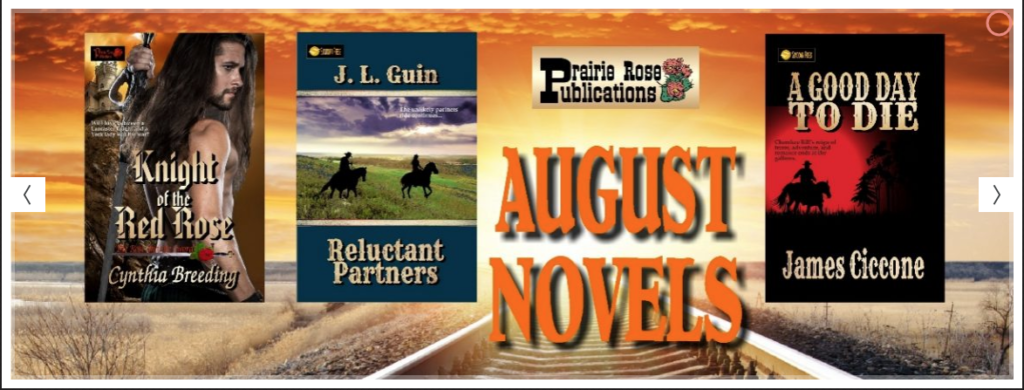
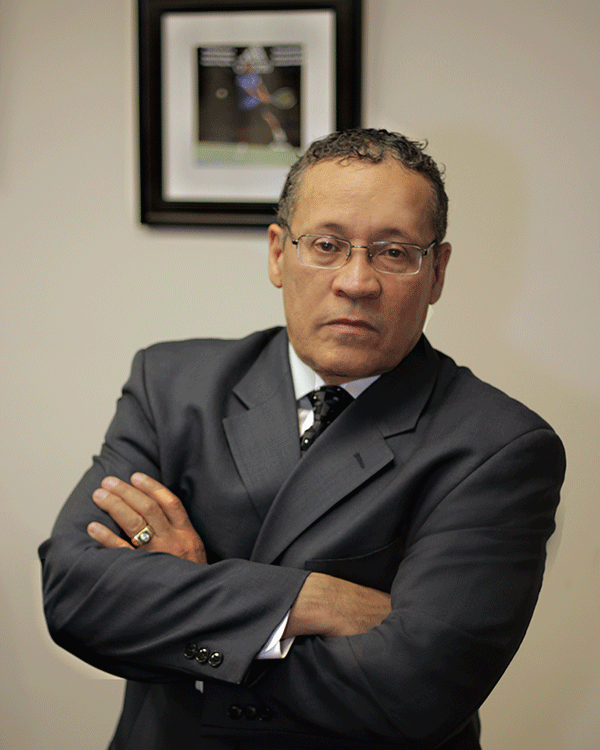
About The Author
James Ciccone was born in Auburn, N.Y. and grew up in nearby Bridgewater where he was a star soccer player at Mt. Markham High School and later for Colgate University and Sal Caruso of Utica, N.Y. He started publishing poetry and articles in national and regional magazines and newspapers as a teenager, including his noteworthy essay on music and religion, The Rituality of Jazz as Composed by John Coltrane.
He graduated Colgate University with a B.A. in Religion before earning a law degree at Albany Law School. In law school, his paper on copyright law placed third in a national writing competition sponsored by ASCAP. He traded his ambition to write novels in order to practice law as a trial attorney in New York City and as pro bono general counsel to the historic American Tennis Association.
After leaving the practice of law, he began writing novels. He was a ghost writer for several books, including a NY Times best seller. His debut novel, A Good Day to Die, draws upon his lifelong love of horses, westerns, history, and the rural outdoors.
His son, Vincenzo Ciccone, was a national champion tennis player who represented Jamaica, W.I. in Davis Cup. He also has two beloved daughters, Cynthia and Chloe Ciccone, who each achieved high levels of academic success and a grandson, Princeton James, who is a toddler.
“I noticed businesses are making money with the keywords: “Black Lives Matter” and “antiracism,” hot topics in today’s climate. Of course, among the most remarkable aspects of our story about the outlaw Cherokee Bill is those keywords actually apply will peculiar force. Specifically, the story reminds us that Cherokee Bill experienced exactly the same cruel and hideous racial situation on the western frontier of the 1890s that Stokely Carmichael, Rap Brown, Jimmy Baldwin, Malcolm X, Martin Luther King Jr. and every other human being within our collective racial memory, including George Floyd and others, experienced throughout the trajectory of this society and continuing to the present day.
Beyond the entertainment that garden variety westerns offer to readers, the train wrecks, stagecoach and bank robberies, snappy dialogue, womanizing, killing sprees, and terror, and the added challenge of figurative speech, this story shows how simply acknowledging the bedrock facts spread across the historical record forms perhaps the most biting form of satire. In this respect, the BLM and antiracism keywords apply to it with a force and persistence that is unmistakable.”
Contact the author
Readers may contact James at ciccone.james@yahoo.com.




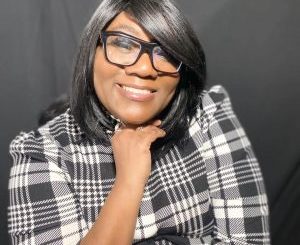
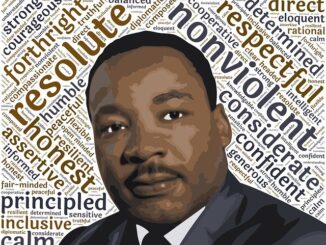
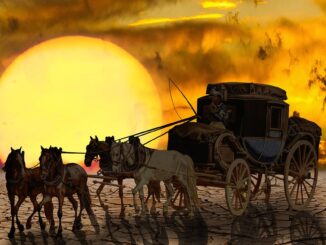
Be the first to comment